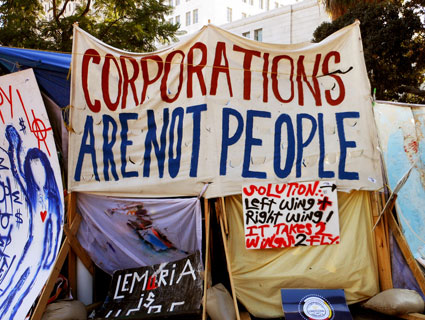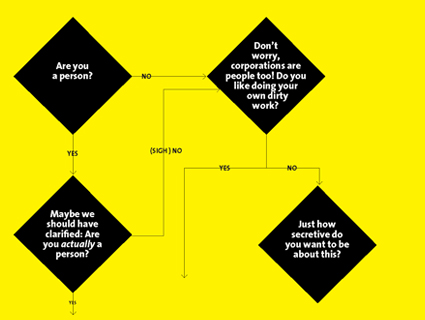
<a href="http://www.flickr.com/photos/63126465@N00/117048243/">Joe Gratz</a>/Flickr
In the latest issue of The New Yorker, Jeffrey Toobin explores how Citizens United v. Federal Election Commission, a seemingly narrow case about political attack ads, ended up fundamentally changing campaign finance law and becoming the signature decision of the Roberts court. So what could be the next Citizens United? Here’s a look at some of the biggest campaign finance cases working their way through the federal court system, and what they could mean for those who’d like to reform the current system (and roll back Citizens United):
Van Hollen v. FEC
Outlook for reformers: Promising
Last month, a district court closed a major loophole that allowed outside groups producing election ads (for example, Karl Rove’s Crossroads GPS) to avoid disclosing their donors. On Monday, a three-judge panel of the DC Circuit Court of Appeals rejected a request to stay the decision, putting an end to the secret financing of ads airing within 60 days of a general election—that is, if the notoriously ineffective Federal Election Commission enforces it.
Rick Hasen, an election law expert at the University of California-Irvine, says the case remains a “moving target,” but he suspects the request for a stay will wind up before the Supreme Court, which voted 8-1 to uphold disclosure laws in Citizens United. Fred Wertheimer, president of the watchdog group Democracy 21 and one of the lawyers who filed suit against the FEC, considers the case “the first major breakthrough in the battle to restore disclosure of contributions being spent to influence federal elections.” Rep. Chris Van Hollen (D-Md.) and Democracy 21 are considering bringing a second lawsuit that would take aim at the disclosure rules for outside ads that specifically call for the election or defeat of candidates.
United States v. Danielczyk
Outlook for reformers: Uncertain
Danielczyk began as a criminal indictment against two businessmen charged with funneling corporate treasury funds to Hillary Clinton’s 2008 campaign. The accused responded by arguing that direct corporate donations to candidates are—contrary to a century of federal law—protected by the First Amendment. A district court judge agreed, ruling that “for better or worse, Citizens United held that there is no distinction between an individual and a corporation with respect to political speech.” The government has appealed, contending that the courts should abide by a 2003 Supreme Court ruling, FEC v. Beaumont, which upheld the ban on corporate donations to candidates.
Hasen expects the 4th Circuit Court of Appeals to uphold the ban, calling the district court ruling an “outlier.” If the case comes before the Supreme Court, however, he says “all bets are off.” Tara Malloy, a lawyer at the Campaign Legal Center—which filed an amicus brief with Democracy 21 supporting the government’s case—is more hopeful. She points to Republican National Committee v. FEC, a failed challenge to the ban on political parties taking and spending unlimited campaign money that the Supreme Court declined to review in 2010. Also, the Roberts court has been inconsistent in its interpretation of what defines political speech: Despite ruling in Citizens United that the identity of the political speaker/donor doesn’t matter, it declined to hear Blumen v. FEC, in which the plaintiffs argued that foreign nationals living in the United States should be able to make campaign donations.
Wagner v. FEC
Outlook for reformers: Excellent
The Wagner case, supported by the American Civil Liberties Union, involves three individuals with federal government research contracts who, as a result, are barred from donating money to federal candidates and parties. They argue that the ban violates their First Amendment rights as well as their equal-protection rights under the Fifth Amendment, since federal employees without government contracts are allowed to donate money to federal campaigns.
The case is currently held up in a Washington district court. In April it denied the plaintiffs a preliminary injunction to delay enforcement of the contribution ban until the case was decided, on the grounds that their claims were unlikely to withstand legal scrutiny. Still, Hasen believes that the money-as-political-speech issue in Wagner is similar to that in Danielczyk, meaning it’s not clear how the Supreme Court would rule on the case, should it go that far.
American Tradition Partnership v. Bullock
Outlook for reformers: Not very promising
In Citizens United, the Supreme Court’s five-justice majority maintained, without much evidence, that independent political spending by corporations does not corrupt the democratic process. Last December, Montana’s Supreme Court thumbed its nose at the opinion, affirming state Attorney General Steve Bullock’s claim (PDF) that the state’s Corrupt Practices Act of 1912 remained valid because it “has safeguarded the republican form of government in Montana for a century from the scourge of political corruption.”
The Supreme Court stayed the Bullock case in February. But because it so directly confronts the reasoning behind Citizens United, the high court will come back to it. Most likely, the justices will summarily reverse the Montana high court’s decision without hearing arguments. However, the court could take Justice Ruth Bader Ginsburg and Stephen Breyer’s advice (PDF) and consider reinterpreting Citizens United on the grounds that Bullock’s documentation of the century-long fight against political corruption in his state (PDF) contradicts Citizens United‘s contention that unlimited third-party expenditures “do not give rise to corruption or the appearance of corruption.”
Hasen doesn’t think the Montana challenge has any chance of succeeding without a change in the make-up of the Supreme Court. Likewise, Malloy says, “The Montana AG is fighting the good fight, but I guess one could argue that he’s sort of tilting at windmills.” If the Montana Supreme Court ruling goes down, it would undoubtedly add a new sense of urgency to the movement to roll back Citizens United through a constitutional amendment.
















